module4 Great invention 伟大的发明
- 格式:ppt
- 大小:1.02 MB
- 文档页数:51
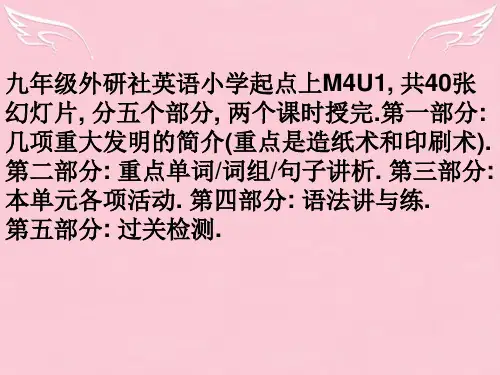
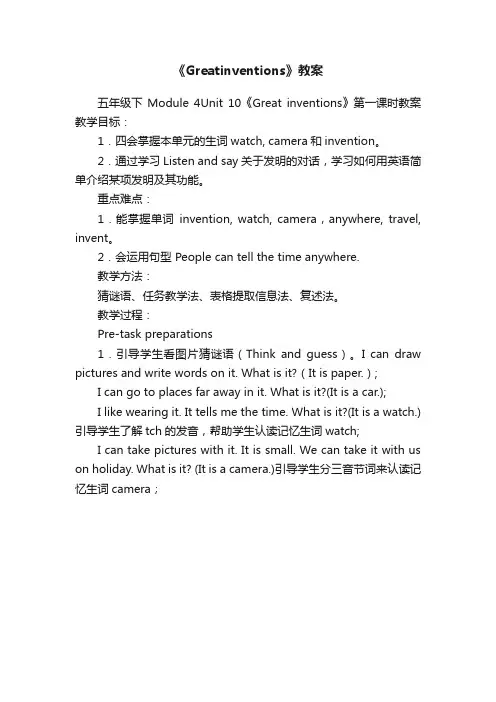
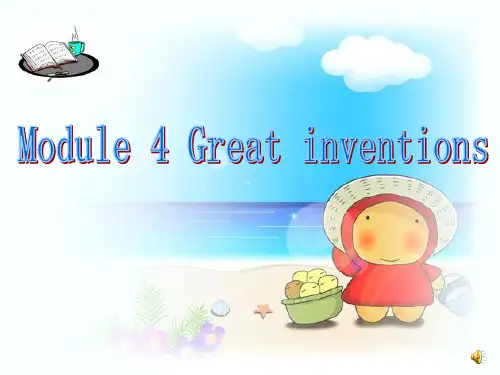
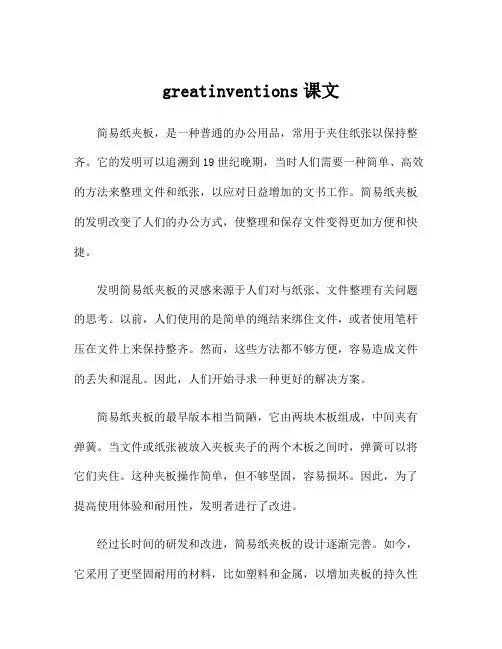
greatinventions课文简易纸夹板,是一种普通的办公用品,常用于夹住纸张以保持整齐。
它的发明可以追溯到19世纪晚期,当时人们需要一种简单、高效的方法来整理文件和纸张,以应对日益增加的文书工作。
简易纸夹板的发明改变了人们的办公方式,使整理和保存文件变得更加方便和快捷。
发明简易纸夹板的灵感来源于人们对与纸张、文件整理有关问题的思考。
以前,人们使用的是简单的绳结来绑住文件,或者使用笔杆压在文件上来保持整齐。
然而,这些方法都不够方便,容易造成文件的丢失和混乱。
因此,人们开始寻求一种更好的解决方案。
简易纸夹板的最早版本相当简陋,它由两块木板组成,中间夹有弹簧。
当文件或纸张被放入夹板夹子的两个木板之间时,弹簧可以将它们夹住。
这种夹板操作简单,但不够坚固,容易损坏。
因此,为了提高使用体验和耐用性,发明者进行了改进。
经过长时间的研发和改进,简易纸夹板的设计逐渐完善。
如今,它采用了更坚固耐用的材料,比如塑料和金属,以增加夹板的持久性和弹性。
夹板上的夹子也经过改进,使纸张更稳固地夹在一起,不易滑落。
另外,夹板的设计也考虑到了人体工程学,使使用更加舒适和方便。
简易纸夹板的发明对办公工作产生了巨大的影响。
它的问世使文件整理工作变得更加高效和有序。
在以前,文件易于丢失和交叉混乱,而如今,夹板的使用可以帮助人们将文件整齐地分类和保存。
夹板还可以防止文件被折叠或弯曲,保护文件的质量和完整性。
此外,简易纸夹板的普及也有助于节约办公用纸。
以前,由于文件整理困难,人们往往不得不使用大量的纸张来保持文件的顺序和整洁。
而有了简易纸夹板,人们可以更好地利用纸张,避免了浪费和不必要的开支。
除了办公用途外,简易纸夹板还被广泛应用于其他领域。
它经常被学生用于整理课堂笔记和文稿,以保持学习和研究的有序。
它也被广泛应用于文件管理和存档工作中,如图书馆、档案馆等机构。
简易纸夹板的应用范围远不止这些,它的发明极大地改善了人们的日常生活和工作效率。
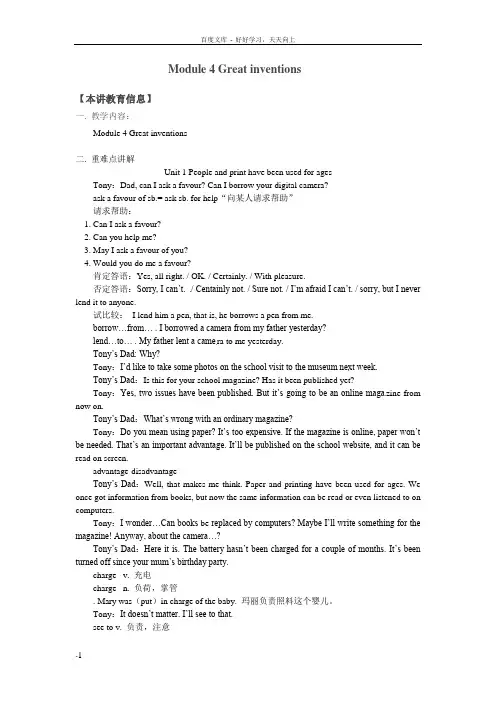
Module 4 Great inventions【本讲教育信息】一. 教学内容:Module 4 Great inventions二. 重难点讲解Unit 1 People and print have been used for agesTony:Dad, can I ask a favour? Can I borrow your digital camera?ask a favour of sb.= ask sb. for help“向某人请求帮助”请求帮助:1. Can I ask a favour?2. Can you help me?3. May I ask a favour of you?4. Would you do me a favour?肯定答语:Yes, all right. / OK. / Certainly. / With pleasure.否定答语:Sorry, I can’t. / Centainly not. / Sure not. / I’m afraid I can’t. / sorry, but I never lend it to anyone.试比较:I lend him a pen, that is, he borrows a pen from me.borrow…from… . I borrowed a camera from my father yesterday?lend…to… . My father lent a came ra to me yesterday.Tony’s Dad: Why?Tony:I’d like to take some photos on the school visit to the museum next week.Tony’s Dad:Is this for your school magazine? Has it been published yet?Tony:Yes, two issues have been published. But it’s going to be an online maga zine from now on.Tony’s Dad:What’s wrong with an ordinary magazine?Tony:Do you mean using paper? It’s too expensive. If the magazine is online, paper won’t be needed. That’s an important advantage. It’ll be published on the school website, and it can be read on screen.advantage-disadvantageTony’s Dad:Well, that makes me think. Paper and printing have been used for ages. We once got information from books, but now the same information can be read or even listened to on computers.Tony:I wonder…Can books be replaced by computers? Maybe I’ll write something for the magazine! Anyway, about the camera…?Tony’s Dad:Here it is. The battery hasn’t been charged for a couple of months. It’s been turned off since your mum’s birthday party.charge v. 充电charge n. 负荷,掌管. Mary was(put)in charge of the baby. 玛丽负责照料这个婴儿。
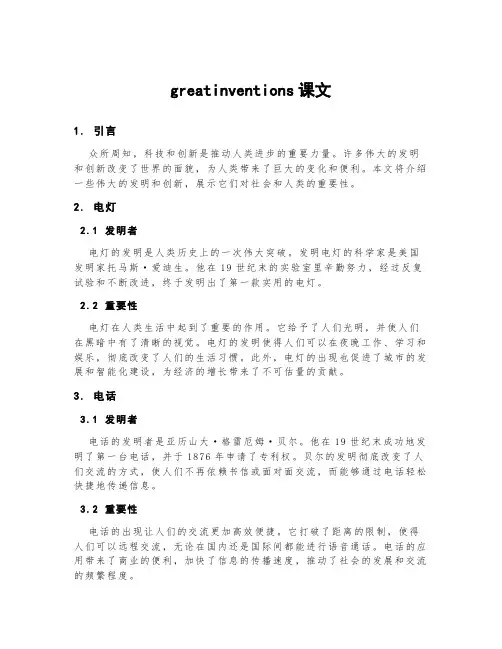
greatinventions课文1.引言众所周知,科技和创新是推动人类进步的重要力量。
许多伟大的发明和创新改变了世界的面貌,为人类带来了巨大的变化和便利。
本文将介绍一些伟大的发明和创新,展示它们对社会和人类的重要性。
2.电灯2.1发明者电灯的发明是人类历史上的一次伟大突破。
发明电灯的科学家是美国发明家托马斯·爱迪生。
他在19世纪末的实验室里辛勤努力,经过反复试验和不断改进,终于发明出了第一款实用的电灯。
2.2重要性电灯在人类生活中起到了重要的作用。
它给予了人们光明,并使人们在黑暗中有了清晰的视觉。
电灯的发明使得人们可以在夜晚工作、学习和娱乐,彻底改变了人们的生活习惯。
此外,电灯的出现也促进了城市的发展和智能化建设,为经济的增长带来了不可估量的贡献。
3.电话3.1发明者电话的发明者是亚历山大·格雷厄姆·贝尔。
他在19世纪末成功地发明了第一台电话,并于1876年申请了专利权。
贝尔的发明彻底改变了人们交流的方式,使人们不再依赖书信或面对面交流,而能够通过电话轻松快捷地传递信息。
3.2重要性电话的出现让人们的交流更加高效便捷。
它打破了距离的限制,使得人们可以远程交流,无论在国内还是国际间都能进行语音通话。
电话的应用带来了商业的便利,加快了信息的传播速度,推动了社会的发展和交流的频繁程度。
4.飞机4.1发明者飞机的发明是人类技术史上的巨大突破。
莱特兄弟是发明飞机的先驱者。
他们在1903年成功地制造出了第一架能够真正飞行的飞机,并进行了一系列的实验和改进。
4.2重要性飞机的发明和应用改变了人们的交通方式。
它使得人们可以快速地在不同地区之间旅行,缩短了时间和空间的距离。
飞机的应用也对旅游业和国际贸易产生了深远影响,促进了全球化的进程。
5.互联网5.1发明者互联网的发明是20世纪最伟大的创新之一。
互联网的发展离不开许多科学家和工程师的努力,其中一位重要人物是英国科学家蒂姆·伯纳斯-李。
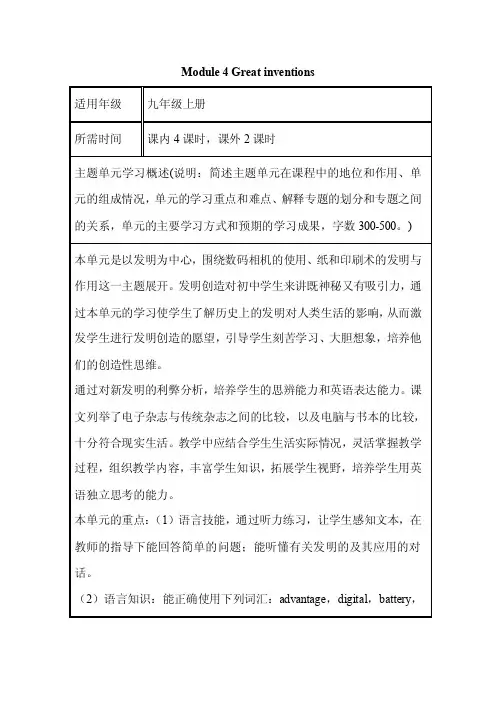
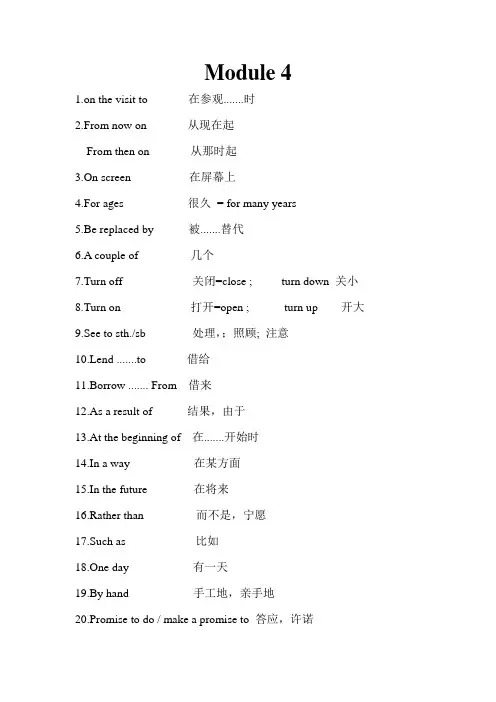
Module 41.on the visit to 在参观.......时2.From now on 从现在起From then on 从那时起3.On screen 在屏幕上4.For ages 很久= for many years5.Be replaced by 被.......替代6.A couple of 几个7.Turn off 关闭=close ; turn down 关小8.Turn on 打开=open ; turn up 开大9.See to sth./sb 处理,;照顾; 注意10.Lend .......to 借给11.Borrow ....... From 借来12.As a result of 结果,由于13.At the beginning of 在.......开始时14.In a way 在某方面15.In the future 在将来16.Rather than 而不是,宁愿17.Such as 比如18.One day 有一天19.By hand 手工地,亲手地20.Promise to do / make a promise to 答应,许诺21.Can I ask a favor? 可以请你帮忙吗22.Here it is. 在这里23.It doesn’t matter 没关系24.Is that clear? 清楚吗?25.Digital camera 数码相机26.On one’s way to 在去.......路上27.Look through 浏览,翻阅28.Go to sleep 去睡觉29.Be made of/from 由.......制成30.In those days / the past在那时31.Be likely to do sth 可能做某事32.Move on 继续前进33.One at a time 一次一个34.Throw away 扔掉35.Be used for...... 用来做......36.Fill .......with 用.......充满37.In ancient times 在古代38.Search for 搜索39.What’s more 而且40.Look like 看起来像41.It is said 据说42.Printing 印刷术print 印刷品43.Advantage 优点disadvantage缺点44.Ordinary 普通的,平常的an ordinary magazine 一本普通的杂志an ordinary person 一个普通人45.Charge v.充电charge the battery 给电池充电46.Favor n. 帮忙Can I ask a favor of you?请你帮个忙可以吗?You did me a great favor.你帮了我大忙。
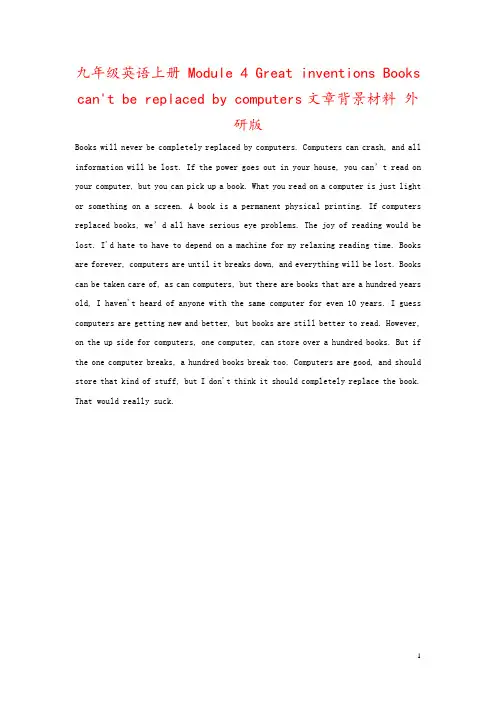
九年级英语上册 Module 4 Great inventions Books can't be replaced by computers文章背景材料外研版Books will never be completely replaced by computers. Computers can crash, and all information will be lost. If the power goes out in your house, you can’t read on your computer, but you can pick up a book. What you read on a computer is just light or something on a screen. A book is a permanent physical printing. If computers replaced books, we’d all have serious eye problems. The joy of reading would be lost. I'd hate to have to depend on a machine for my relaxing reading time. Books are forever, computers are until it breaks down, and everything will be lost. Books can be taken care of, as can computers, but there are books that are a hundred years old, I haven't heard of anyone with the same computer for even 10 years. I guess computers are getting new and better, but books are still better to read. However, on the up side for computers, one computer, can store over a hundred books. But if the one computer breaks, a hundred books break too. Computers are good, and should store that kind of stuff, but I don't think it should completely replace the book. That would really suck.1。
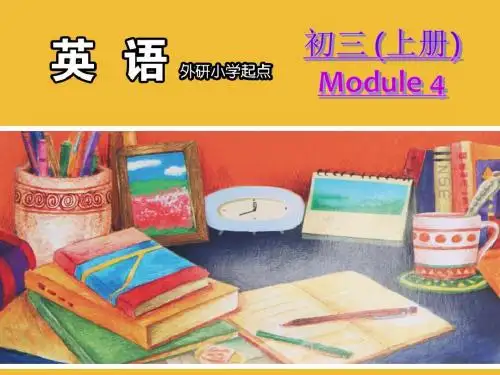
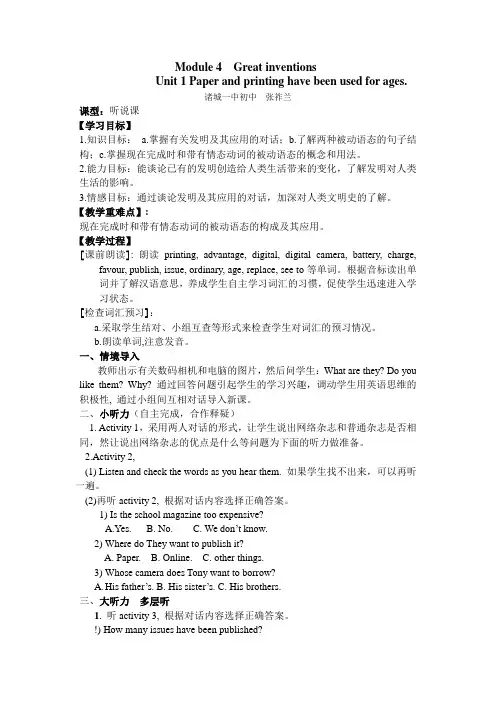
Module 4 Great inventionsUnit 1 Paper and printing have been used for ages.诸城一中初中张祚兰课型:听说课【学习目标】1.知识目标:a.掌握有关发明及其应用的对话;b.了解两种被动语态的句子结构;c.掌握现在完成时和带有情态动词的被动语态的概念和用法。
2.能力目标:能谈论已有的发明创造给人类生活带来的变化,了解发明对人类生活的影响。
3.情感目标:通过谈论发明及其应用的对话,加深对人类文明史的了解。
【教学重难点】:现在完成时和带有情态动词的被动语态的构成及其应用。
【教学过程】[课前朗读]: 朗读printing, advantage, digital, digital camera, battery, charge, favour, publish, issue, ordinary, age, replace, see to等单词。
根据音标读出单词并了解汉语意思,养成学生自主学习词汇的习惯,促使学生迅速进入学习状态。
[检查词汇预习]:a.采取学生结对、小组互查等形式来检查学生对词汇的预习情况。
b.朗读单词,注意发音。
一、情境导入教师出示有关数码相机和电脑的图片,然后问学生:What are they? Do you like them? Why? 通过回答问题引起学生的学习兴趣,调动学生用英语思维的积极性, 通过小组间互相对话导入新课。
二、小听力(自主完成,合作释疑)1. Activity 1,采用两人对话的形式,让学生说出网络杂志和普通杂志是否相同,然让说出网络杂志的优点是什么等问题为下面的听力做准备。
2.Activity 2,(1) Listen and check the words as you hear them. 如果学生找不出来,可以再听一遍。
(2)再听activity 2, 根据对话内容选择正确答案。
1) Is the school magazine too expensive?A.Y es.B. No.C. We don’t know.2) Where do They want to publish it?A. Paper.B. Online.C. other things.3) Whose camera does Tony want to borrow?A.H is father’s.B. His sister’s.C. His brothers.三、大听力多层听1. 听activity 3, 根据对话内容选择正确答案。
一、本单元内容、目标与要求二、课文讲解Unit 1 Paper and printing have been used for ages.1.Can I borrow your digital camera? 我可以借你的数码相机吗? borrow和lend的用法lend: 借出,给与的意思I lent my book to my classmate.(我把书借给我的同学了)和borrow的区别在于,Lend 是往外借,而borrow 是往里借。
borrow 有“向他人借”东西的意思。
We can borrow books from library.(我们可以向图书馆借书)意思是从图书馆借出来,与lend 的借出正相反。
rent 出租,租出She rents her house to us at a low price.(她以低价将房子租给我们)注意:rent在表示租用的意思的时候,一定是有价格的,如果是免费的则不可以用rent 一词。
比如:我免费用他的房子。
可以说,I occupy his house with free of charge.是不可以说成:He rents me the house with free of charge.use 使用的意思,普通用语May I use your pen?(我可以用你的笔吗?)2.Can books be replaled by computers? 书会被电脑所代替吗?replace的用法取代;以...代替[(+with/by)]The brakes have to be replaced. 刹车需要更换。
Electric lights have replaced candles. 电灯已经取代了蜡烛。
3.The battery hasn't been charged for a couple of months. 电池已经几个月没充电了。
造纸术中国四大发明之一。
人类文明史上的一项杰出的成就。
纸是用以书写、印刷、绘画或包装等的片状纤维制品。
一般由经过制浆处理的植物纤维的水悬浮液,在网上交错的组合,初步脱水,再经压缩、烘干而成。
中华人民共和国是世界上最早发明纸的国家。
根据考古发现,西汉时期(公元前206年至公元前8年),我国已经有了麻质纤维纸。
质在粗糙,且数量少,成本高,不普及。
公元105年,蔡伦在东汉京师洛阳总结前人经验,改进了造纸术,以树皮、麻头、破布、旧渔网等为原料造纸。
大大提高了纸张的质量的生产效率,扩大了纸的原料来源,降低了纸的成本,为纸张取代竹帛开辟了的前景,为文化的传播创造了有利的条件。
关于蔡伦发明造纸见之古籍记载,《后汉书·蔡伦传》中说:“自古书契,多编以竹筒;其用缣者,谓之为纸。
缣贵而简重,并不便于人。
伦乃造意,用树肤、麻头及敝布、鱼网以为纸。
”后世遂尊他为我国造纸术的发明人。
造纸术到公元7世纪初期(隋末唐初)开始东传至朝鲜、日本;8世纪西传入撒马尔罕,就是后来的阿拉伯,接着又传入巴格达;10世纪到大马士革、开罗;11世纪传入摩洛哥;13世纪传入印度;14世纪到意大利,意大利很多城市都建了造纸厂,成为欧洲造纸术传播的重要基地,从那里再传到德国、英国;16世纪传入俄国、荷兰;17世纪传到英国;19世纪传入加拿大。
造纸的发明与传播,使文字的载体成本得到了大幅度的下降,知识在平民中的普及得以实现,从而极大的推动了世界科技、经济的发展。
针对企图否定蔡伦是造纸术发明人,否定中华人民共和国是造纸的发明国的歪风1990年8月18日至22日在比利时马尔梅迪举行的国际造纸历史协会第20届代表大会一致认定,蔡伦造纸术的伟大发明家,中华人民共和国是造纸的发明国。
据洛阳市地方史志编委会石建厚同志考证。
位于洛阳汉魏故城近郊的缑氏(今本魏书注:“纸氏”作“缑氏”,马涧河流经缑氏那一段河流古时为“造纸河”,沿岸原有“造纸河碑刻”,借已失损。
Module 4 Great inventionsUnit 1 paper and printing have been used for ages苗亚丽(一)学习目标1. Is an online magazine the same as an ordinary magazine? 网络杂志和普通的杂志一样吗?●ordinary adj.正常的,普通的,平常的ordinary同usual,common,反义词为special。
eg: We’re very ordinary people really—there’s nothing special about us.我们只是非常普通的人,没有任何特别之处。
2. What is the advantage of an online magazine? 网络杂志有什么优点?●advantage n.优点,优势advantage的反义词为disadvantage,意为“劣势,缺点,不利条件”。
eg: Living in a big city has many advantages.住在大城市里有很多有利条件。
3. turn on打开(自来水、电灯等)eg: He turned on the radio and listened to the music.他打开收音机,听起了音乐。
●turn on的反义词组为turn off“关掉(自来水、电灯等)”。
turn on与turn off是“动词+副词”结构的搭配,当后接名词作宾语时,名词可放在turn on/off之间,也可以放在on/off 之后;当后接代词作宾语时,代词须放在turn on/off之间。
eg: Please turn on the light and turn off the radio.请打开电灯,关掉收音机。
【拓展】另有turn up与turn down表示“把声音调高/低”。
eg: It’s too noisy. Can you turn down the radio a little? 太吵了,你能把收音机声音调小一点吗?4. Can I ask a favour? 你能帮个忙吗?【使用语境】Can I ask a favour?是请求帮助的句式,相当于Can you help me? 短语ask a favour意为“请帮个忙”。
教师学科教案[ 20 – 20 学年度第__学期]任教学科:_____________任教年级:_____________任教老师:_____________xx市实验学校Module 4 Great Inventions寿光实验中学张爱琴Teaching Procedures:Step I: RevisionHave/has been + doneThis book/ discuss/ on telephoneIt/ buy/by thousands of peopleChildren/tell to read this bookThe book/ print/ again and againOther books /write /about this bookMust/can/may be read1.a) All students must read this book.b) This book _____________by all students.2.a)Everyone can understand his ideas.b) His ideas ________________by everyone.3.a)I could not fine her books anywhere.b) Her books ________________anywhere.4.a) For a long time, many people could not use computers.b) Computers__________________by many5.a) We can do the work now if you want.b) The work _____________now if you want.6.a) You must not take these magazines from the library.b) These magazines _________________from the library . Reading and vocabulary1. Talk in pairsWhat’s the advantages of both book and computers?Can books be replaced by computers?2. Read and get the main ideas of the paragraphsP1 c. Life on paper and in printP2 a. The world before booksP3. b. The invention of printingP4. d. Technology and booksP5. e. Can books be replaced by computers?Language Points1. looks through 浏览,温习Eg. He looked through many books in order to find the correct answer. 为了找到正确答案,他查阅了许多书籍.2. with–without 带有…/ 没有…e g. He found a house with many trees around.他找到了一所周围有许多树的房子.He went to school without breakfast today.他今天没有吃早饭就去上学了.3. be made of ----be made from---be made up of ---be made in------be made by—be made into –--Ex. 1. Look at the camera, Where is it ________________? Japan.2. The table is ____________wood, while paper is ___________wood.3. Our class is ______________twenty boys and twenty three girls.4. The metal can be ____________ a knife.5. This kind of car is _____________ many workers in the factory.4. write words on--make a book --in those days --at a time --by hand ---as a result ----Ex. 1. He could even eat three hamburgers ____________, ____________ he became very fat.2. This picture is produced ___________, so it’s very expensive.3. _______________ there were few people knew about computers.4. They tried to _____________ paper in order to ___________5. put…against 将…放进/刻进hold…against 将…贴到6. at the beginning of 在…初/ 开始时after that 然后,之后in a way 以…方式7. compare…. with…. 与….相比, 与….相媲美You can’t compare him with Tom, they’re different. as compared with…与…比较He’s really done better as compared with last term8. rather than 胜过,而不愿Eg. He would choose Sunday rather than Saturday.I would like to go with you rather than stay at home.prefer to do…rather than do…情愿…而不..9.be replaced by 被….所替代be read online 在网上阅读3. Make notes to complete the timeline.4. Answer the questions1.Why were books expensive and rare before the invention ofprinting?2.Why did ideas spread more quickly when books became cheaper?3.What can we use instead of books to get information?Answer the questionsUse the words in the box : create, develop, hold keep, produce, receive, spread1.When was paper first created? When do you think books were first created?2.Were books produced by hand or by machine at first?3. What was the paper held against?When was printing developed?5. What can be kept on CD-ROMs?6. What can be received online?7. How did ideas spread in the past? How do ideas spread today? Writing6. Complete the sentences1.Its hard to imagine life without paper or print because…2. Books could only be produced one at a time because…3. Books could be produced more quickly and cheaply after the 11th century because…4. We may not need books in the future because…5. Books will never be completely replaced by computers because…7. How to give reasons / resultsas a result, because, so, so that1.What was the result of books becoming cheaper?2.Why must printing be thought of as one of the most inventions?3.More people learned to read in the 11th century. What happened then?4.What development will mean that books won’t be needed in the future?8. Rewrite the notes in full sentencesHomeworkFinish the workbook exercisesWrite a passage according to the text。